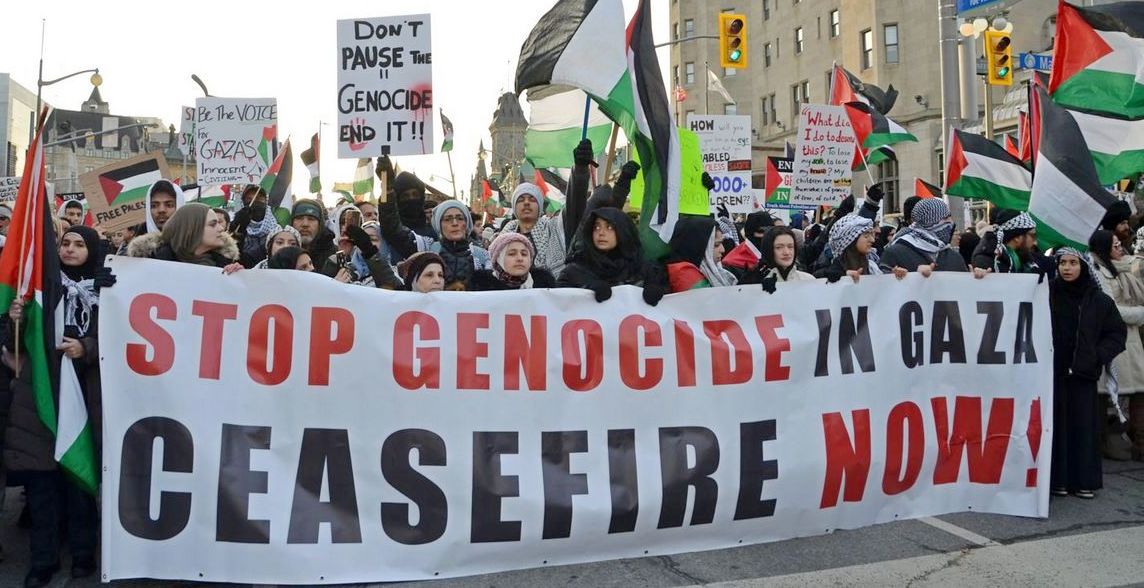No. 4
January 12, 2024
International Court of Justice Hearings on Injunction Against Israel
Court Proceedings in The Hague
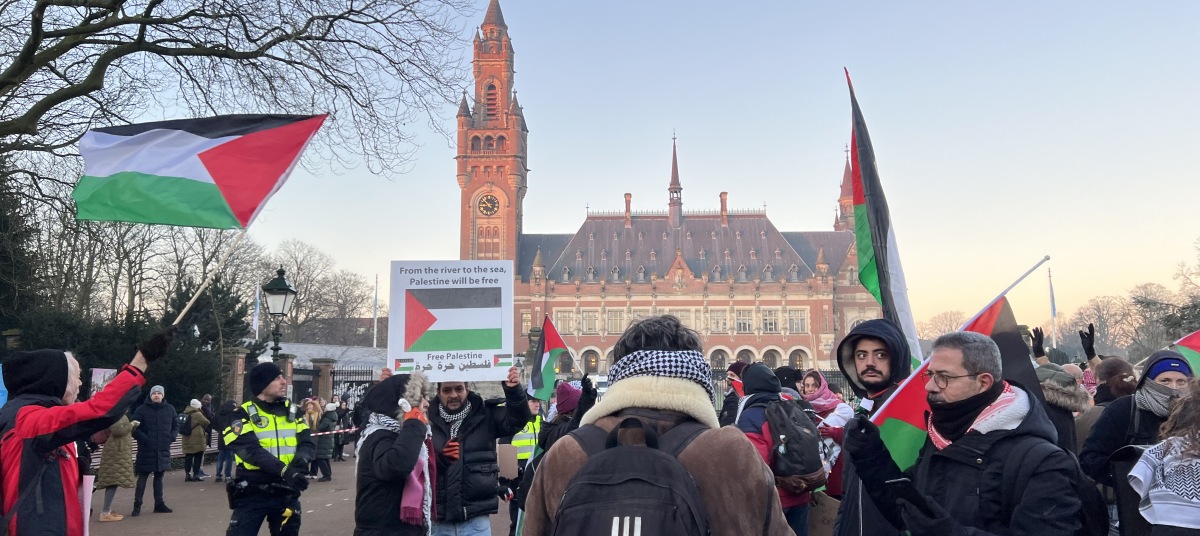
People gather outside
International Court of Justice in The Hague during South
Africa's presentation, January 11, 2024.
• South Africa's Arguments Before the Court
• Countries
Supporting South Africa's Case
Accusing
Israel of Genocide
• Court's Judges and States' Legal Teams
• South Africa Receives Growing Worldwide Support
• Israeli Pressure Campaign to Derail Case Accusing It of Genocide
For Your Information
• Activating the Convention on Genocide Against Israel and Complicit States
Other Developments
• Growing Demands for Ceasefire
• Canadian Support for Israeli Genocide
Brought to
International Criminal Court
• Desperate U.S./UK Attack on Yemen
International Court of Justice Hearings on Injunction Against Israel
Court Proceedings in The Hague
The hearings which began on January 11 before the International Court of Justice in The Hague are focused on South Africa's request for provisional measures against Israel on charges that it is committing genocide in Gaza. On the opening day the South African legal delegation presented oral arguments and the Israeli delegation presents its arguments on January 12.
The most obvious aspect of this case is that two worlds are in combat and that it is necessary to leave the old behind, especially the disinformation which is the act of reactionary states to deprive the peoples of an outlook of their own. The outlook of the people rejects the criminal agenda of the Zionists which tries to justify the heinous crime of genocide. Any argumentation based on denial of the Palestinian people's right to be and denial that the state of Israel is an apartheid state which, since the day of its founding has violated the UN's founding resolution, is for purposes of presenting the genocide of the Palestinian people as normal and denying that Israel's aim is to occupy all of historic Palestine. In this regard, Israeli arguments are based on a pathological inability to feel remorse or take responsibility for their actions.
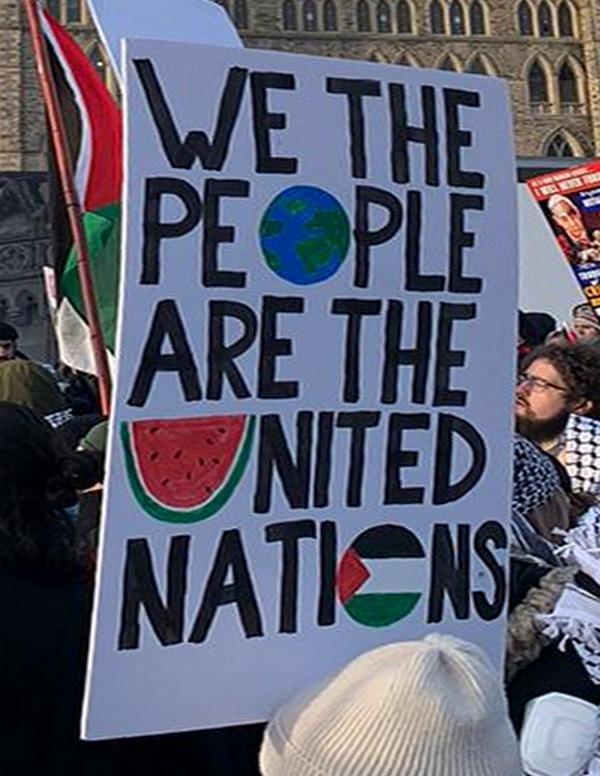 The Palestinians
will prevail and the peoples of the world stand with them. It is not
the judiciary which
will solve the unacceptable plight of the Palestinian people. It is the
resistance movement which stands for high ideals and whose sole aim is
to recognize the Palestinians' Right to Be and Right of Return, and the
necessity to
humanize the social and natural environment to make it fit for human
beings on that basis.
The Palestinians
will prevail and the peoples of the world stand with them. It is not
the judiciary which
will solve the unacceptable plight of the Palestinian people. It is the
resistance movement which stands for high ideals and whose sole aim is
to recognize the Palestinians' Right to Be and Right of Return, and the
necessity to
humanize the social and natural environment to make it fit for human
beings on that basis.
Should the ruling not grant South Africa's request for provisional measures against Israel on charges that it is committing genocide in Gaza, it would not make the case of South Africa any less valiant and righteous. But no one should be surprised or feel discouraged. It would indicate that the resistance struggle must be stepped up, more and more countries should take action to end any conciliation with Israel no matter what pretext they use. Everyone has a role in contributing to the defeat of Israel and those who empower it.
The world stands with South Africa in this case even though, at the end of the day, the struggles of the peoples of the world will not be resolved by courts of law based on laws, international relations and forms of colonial and neo-colonial rule. Necessity compels the peoples of the world to step up the resistance and bring in the New -- a system where they will rule in their own name and not depend on others who act with impunity in their name.
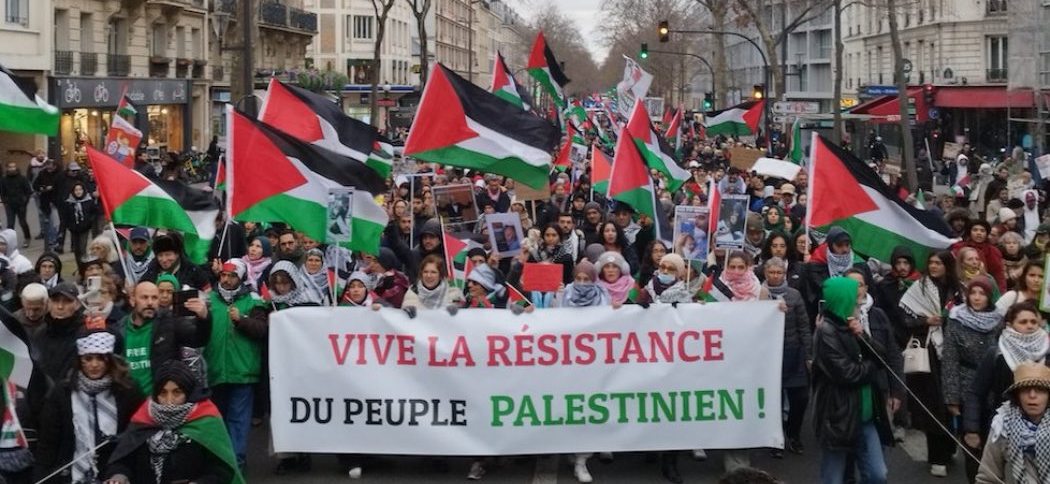
Paris, France, January 6,
2024
South Africa's Arguments Before the Court
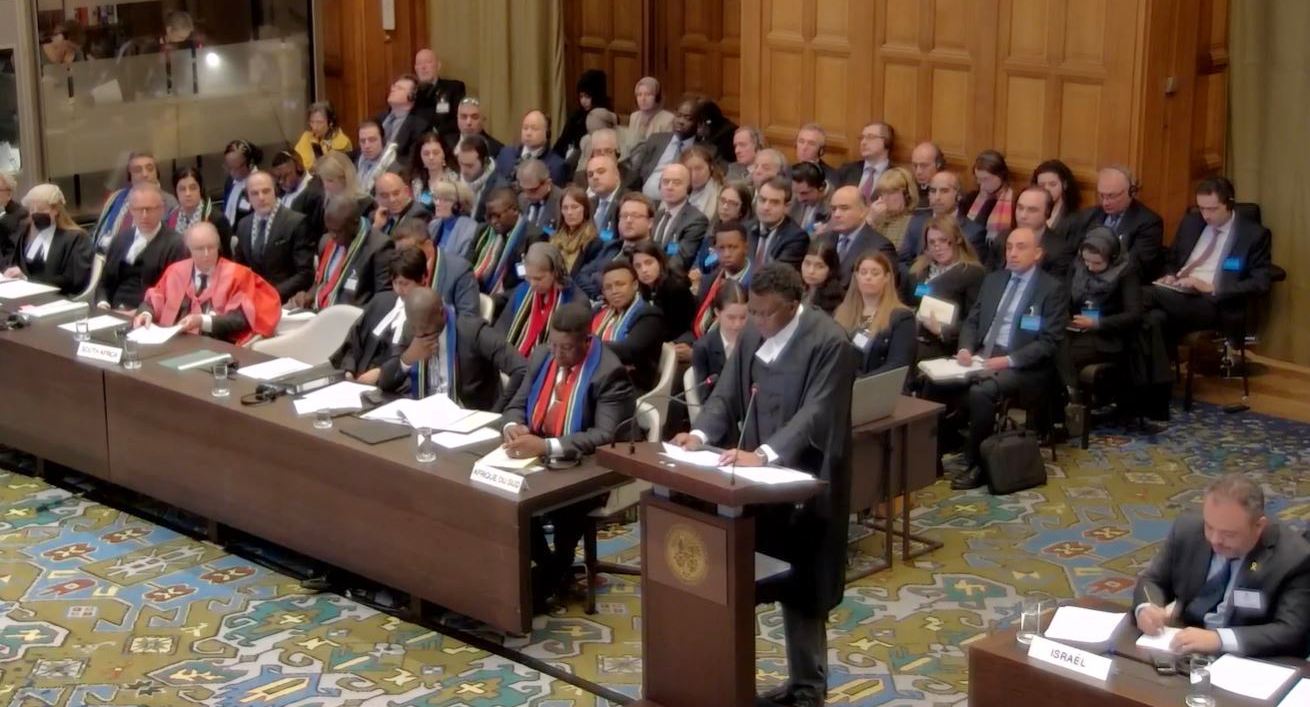
South Africa presents its
case, International Court of Justice, January 11, 2024.
The Palestine Chronicle carried a detailed article on January 11 titled "South Africa Argues 'Genocidal Intent' by Israel in Gaza." The article points out that the South African legal team clearly demonstrated:
1) The "evidence of genocidal intent" through statements by government officials along with videos in which Israeli military forces express a clear understanding of implementing that intent through their murderous actions;
2) Clear evidence of Israel "committing actions that fall within the definition of acts of genocide" contrary to Article II of the Geneva Convention and showing "a systematic pattern of conduct from which genocide can be inferred." Even Israeli so-called notices to evacuate issued ahead of air and ground assaults have been issued and executed in a manner that shows genocidal intent, not humanitarian consideration for the civilian population.
3) Jurisdiction of the International Court of Justice (ICJ).
4) The "right to exist" of Palestinians in Gaza is endangered and as such the right to exist of the Palestinian nation. To situate the right to exist, and the threats to that right, "requires the Court to appreciate that this Application by South Africa is brought within a particular context," Advocate and Law Professor Max Du Plessis explained.
5) That what is happening in Gaza now is not correctly framed as a simple conflict between two parties. It entails, instead, destructive acts perpetrated by an occupying power, Israel, that has subjected the Palestinian people to an oppressive and prolonged violation of their rights to self-determination for 56 years. And those violations, Du Plessis said, "occur in a world where Israel for years has regarded itself as beyond and above the law."
6) That "there is an urgent need for provisional measures to protect Palestinians in Gaza from the irreparable prejudice caused by Israel's violations of the Genocide Convention." It pointed out that the current genocide far exceeds in scope and scale previous cases in which the ICJ has adjudicated and indeed found the facts demonstrated genocide.
7) That the immediate decision required by the ICJ concerned "the question of what provisional measures are required pending its final decision on the merits." Professor Vaughan Lowe said, "Israel says that Palestine and Palestinians are not its target, and that its aim is to destroy Hamas. But months of continuous bombing, flattening entire residential blocks and cutting off food and water and electricity and communications to an entire population, cannot credibly be argued to be a man-hunt for members of Hamas.
"It is an indiscriminate attack, killing, maiming and terrorizing the entire population of Gaza with no regard to questions of innocence or guilt, obliterating the homes and cities in which they live ... and destroying any practical possibility of their return to make their homes amidst the rubble."
Specific preliminary actions called for by the South African legal team included:
- an order from the Court for the "immediate suspension" of Israel's military operations in and against Gaza;
- that any military or irregular armed units take no steps in furthering the military operations referred to before;
- that both South Africa and Israel take reasonable measures within their power to prevent genocide;
- that Israel be requested to submit a report to the Court on all measures taken to give effect "to this Order within one week, as from date of this Order, and thereafter at such regular intervals as the Court shall order, until a final decision on the case is rendered by the Court, and that such reports shall be published by the Court."
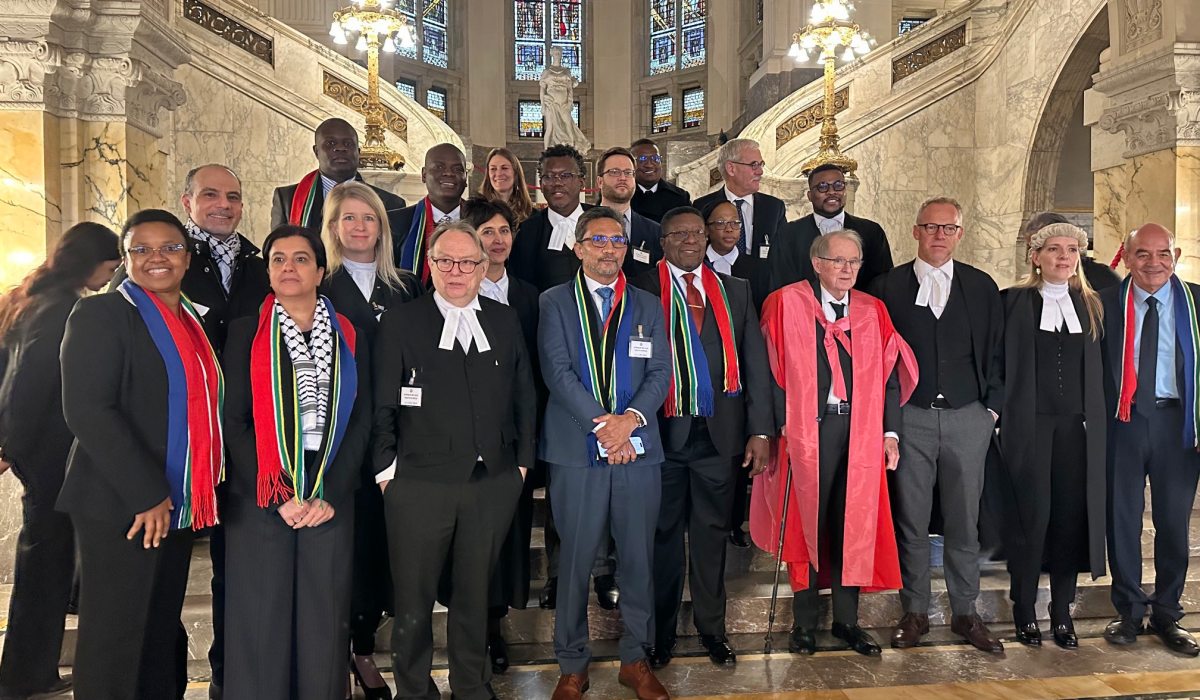
South
Africa's legal team following its presentation to International Court
of Justice,
January 11, 2024.
Countries Supporting South Africa's Case Accusing Israel of Genocide
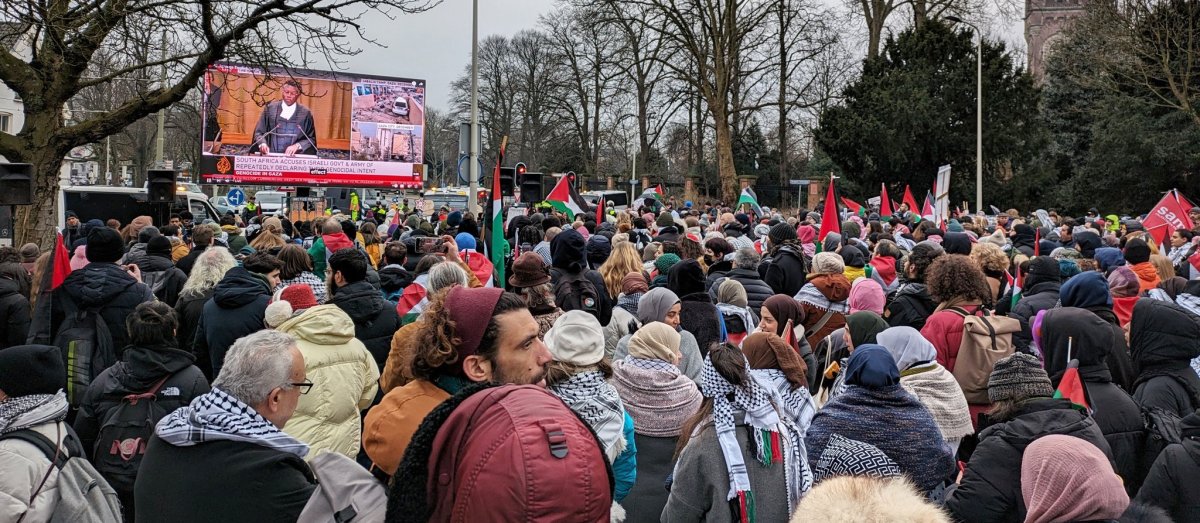
People watch South
Africa's presentation on big screen outside the courthouse, January 11,
2024.
As of January 11, at least 64 countries have given their support to South Africa's case against Israel at the International Court of Justice (ICJ).
Palestine's Ministry of Foreign Affairs and Expatriates issued a statement on December 29, 2023 welcoming South Africa's case.
On December 30, 2023, the Organization of Islamic Cooperation (OIC), gave its support for South Africa's case. Its members are: Afghanistan, Albania, Azerbaijan, Bahrain, Bangladesh, Benin, the United Arab Emirates (UAE), Brunei Darussalam, Burkina Faso, Algeria, Djibouti, Chad, Indonesia, Morocco, Cote d'Ivoire, Palestine, Gabon, Gambia, Guinea, Guinea Bissau, Guyana, Iraq, Iran, Cameroon, Qatar, Kazakhstan, Kyrgyzstan, the Comoros, Kuwait, Libya, Lebanon, Maldives, Malaysia, Mali, Egypt, Mauritania, Mozambique, Niger, Nigeria, Uzbekistan, Pakistan, Senegal, Sierra Leone, Somalia, Sudan, Surinam, Saudi Arabia, Tajikistan, Togo, Tunisia, Türkiye, Turkmenistan, Uganda, Oman, Jordan, Yemen.
The Malaysian Ministry of Foreign Affairs released a statement on January 2 welcoming the case. It reiterated a call for an independent Palestinian state "based on the pre-1967 borders, with East Jerusalem as its capital."
Türkiye, a NATO member, has also officially announced its support for South Africa's case against Israel at the ICJ, asserting that the occupation is committing genocide of Palestinians in its ongoing war on Gaza. In a statement issued January 3 by the Turkish Foreign Ministry, spokesperson Oncu Keceli said that Türkiye welcomes the South African case and expects that the ICJ will issue an interim injunction ordering Israel to stop its attacks on Gaza -- an implementation which Türkiye would be following.
Citing the murder of Palestinian civilians, the majority of whom were women and children, in Gaza for nearly three months, Keceli said they "should not go unpunished in any way." "Those responsible for this must be held accountable before international law," he said, expressing Türkiye's hope "that the process will be completed as soon as possible."
Jordanian Foreign Minister Ayman Safadi said on January 4 that his country would back South Africa.
The Foreign Ministry of Maldives issued a statement on January 4 welcoming South Africa's application to the ICJ.
Bolivia took its stand to back South Africa on January 7 with its Foreign Minister Mamani noting:
"Israel violates International Law through the treatment of the civilian population in armed conflicts." He urged the international community to end Israel's occupation of Palestine, allow its people to exercise their right to self-determination in a free, independent and sovereign state within pre-1967 borders with East Jerusalem as its capital.
Bangladesh said it welcomed the case during a UN General Assembly session on January 9.
Namibia also expressed its support for the case during the January 9 UN General Assembly session, saying, "By intent and by number, the actions carried out by Israel are tantamount to genocide [...] For this reason, we welcome the [...] action of South Africa at the [ICJ]. Namibia both identifies and aligns with the arguments put forward by the government of South Africa."
Pakistan, during the January 9 UN General Assembly session, said it "welcomes South Africa's initiative to bring Israel's transgressions under the Genocide Convention to the International Court of Justice."
So too Nicaragua issued a statement on January 9 saying in part: "As a State Party to the Genocide Convention, Nicaragua urges Israel to fulfill its obligations under International Law and to immediately end its military assault against the Palestinian People." It also called for an end to the occupation, the establishment of conditions for a lasting and permanent solution that respects the 1967 borders with a sovereign and independent Palestinian state.
The government of Venezuela issued a press release on January 9 that said in part, "Venezuela, as a country committed to peace diplomacy, recognizes South Africa's firm and historic step in defence of the Palestinian people and International Law."
On January 9, the Secretary-General of the Arab League affirmed the organization's support for the case. Its members are: Algeria, Bahrain, Comoros, Djibouti, Egypt, Iraq, Jordan, Kuwait, Lebanon, Libya, Mauritania, Morocco, Oman, Palestine, Qatar, Saudi Arabia, Somalia, Sudan, Syria, Tunisia, the United Arab Emirates and Yemen.
Brazil's Foreign Ministry said in a January 10 statement that considering "the flagrant violations of international humanitarian law," the country's president expressed support for South Africa's case with the goal of ordering "Israel to immediately cease all acts and measures that may constitute genocide or related crimes under the terms of the Convention for the Prevention and Punishment of the Crime of Genocide."
The Colombian Ministry of Foreign Affairs issued a press release on January 10 commending the Government of South Africa for its lawsuit which it called a brave step in the right direction. It stated that “from the very beginning of the bloody phase of the conflict in Palestine, it is very clear that the actions and measures adopted by the government of Israel constitute acts of genocide. As a State, Israel is obliged to prevent and avoid these international criminal offenses at all costs and, consequently, its failure to comply with these commitments entails its responsibility to the entire world.” The press release further stated that “Colombia intends to enforce the high objectives of the Convention to which it is also a State party and is therefore willing to accompany this judicial action through resources and procedural tools provided by the Statute and practice of the International Court of Justice.”
Cuba's Ministry of Foreign Affairs, on January 11, issued a statement decrying Israel's mass killings and impunity in Gaza and affirmed that as a signatory to the Genocide Convention, it expressed its support for South Africa's case before the ICJ. "Despite repeated calls for peace in the illegally occupied territories, for the past 75 years a crime of genocide has been clearly being perpetrated and is now taking on extreme proportions and requires the joint action of the peoples and governments of the world to immediately halt the indiscriminate extermination of girls, boys, women and the civilian population in general," the statement said.
Court's Judges and States' Legal Teams
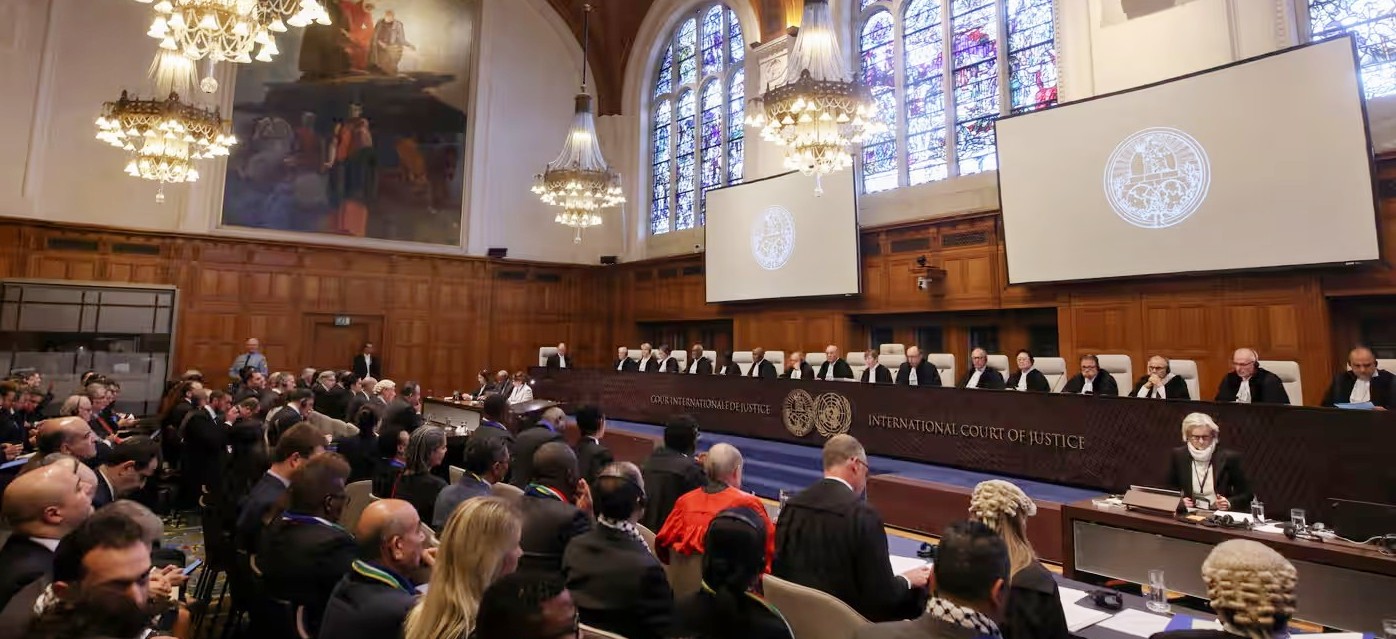
International Court of
Justice hears South Africa's presentation, January 11, 2024.
The International Court of Justice (ICJ) is normally comprised of 15 judges. Based on an informal understanding all regions of the world are usually represented. Judges serve staggered nine-year terms and are elected by simultaneous and separate votes in the UN's General Assembly and Security Council, where they must receive a majority in both bodies. Typically, each permanent member of the UN Security Council has a judge on the ICJ. There cannot be more than one judge from any country.
Under ICJ rules, a state coming before the ICJ that does not have a judge of its citizenship already on the bench can choose an ad hoc judge to join the court for the proceedings. For this reason in the case brought by South Africa against Israel, the bench is being expanded by two more judges to 17.
The ICJ's decisions are made based on simple majority.
South Africa has appointed Dikgang Moseneke as its ad hoc judge. He is a South African judge and former Deputy Chief Justice of South Africa. When he was a youth, he was arrested and imprisoned for participating in anti-apartheid activity. He was imprisoned for 10 years on Robben Island, where he came to know Nelson Mandela and other leaders in the anti-apartheid movement.
Israel has appointed Aharon Barak, a retired Israeli Supreme Court president, who fled the Nazi-occupation of Lithuania while a child. The New Arab reports, "Throughout his 11-year tenure as president, Barak upheld the 'otherness' of Palestinians and had been regarded as 'Israel's public defender abroad,' [including] defending the Israeli Supreme Court's decision on the illegal wall of segregation in 2004.
"Barak additionally showed support for Israel's war on Gaza and claimed the military offensive was not in violation of humanitarian law.
"He argued that the rules of collateral damage permit the killing of Palestinian fighters even if led to the deaths of children. This was approved by Barak himself in a 2006 Supreme Court ruling, as cited in a report by Canadian news outlet The Globe and Mail.
"'It may be proportional to kill five innocent kids in order to target their leader,' Barak was quoted in an interview by the publication."
As concerns each country's legal team, there is no bar association related to the ICJ. Counsel representing states at the ICJ do not have to be lawyers or citizens of the countries they are representing. They only have to be competent at presenting the case of the state that has selected them.
South Africa's Legal Team
The New Arab informs that South Africa's main legal team is comprised of:
"John Dugard is one of South Africa's foremost international law experts, and a former UN Special Rapporteur on Human Rights in the Occupied Palestinian Territory.
"Dugard is no stranger to the ICJ, having served as an ad hoc judge for the court in the 2000s.
"He has previously said that apartheid carried out by Israel on Palestinians is in some respects worse than that committed on Black people in South Africa in the 20th century. [...]
"Adila Hassim ... Hassim has been practising law for two decades, and has also served as an acting judge.
"She is the co-founder and director of litigation at Section27, 'a public interest law Centre that advocates for access to health care services and basic education.'
"She also co-founded the anti-corruption organization Corruption Watch [...].
"Tembeka Ngcukaitobi [...] is a South African lawyer and legal scholar who rose to prominence in cases that helped bring down then South African President Jacob Zuma, who had been accused of wide-scale corruption.
"The 47-year-old has written books on land law and land reform in South Africa.
"Max du Plessis [...] is a barrister and associate professor of law at the University of KwaZulu-Natal in Durban, South Africa.
"He has appeared in leading cases on international law and human rights in South Africa's highest courts.
"He has spoken at tribunals about the prohibition of apartheid by international law in the context of both South Africa and Palestine."
Israel's Legal Team
Israel is also represented by four lawyers led by British lawyer Malcolm Shaw who The Times of Israel described as "a leading expert on territorial disputes and a published author on the law of genocide [...] who has represented countries including United Arab Emirates, Serbia and Cameroon at the International Court. He is assisted by the legal adviser to the Israel Foreign Ministry Tal Becker.
List of Current Judges
The current members of the ICJ are:
- President Joan E. Donoghue, U.S.
- Vice-President Kirill Gevorgian, Russian Federation
- Judge Peter Tomka, Slovakia
- Judge Ronny Abraham, France
- Judge Mohamed Bennouna, Morocco
- Judge Abdulqawi Ahmed Yusuf, Somalia
- Judge Xue Hanqin, China
- Judge Julia Sebutinde, Uganda
- Judge Dalveer Bhandari, India
- Judge Patric Lipton Robinson, Jamaica
- Judge Nawaf Salam, Lebanon
- Judge Iwasawa Yuji, Japan
- Judge Georg Nolte, Germany
- Judge Hilary Charlesworth, Australia
- Judge Leonardo Nemer Caldeira Brant, Brazil
Detailed biographies of the judges are available on the ICJ website.
(With files from ICJ, New Arab, Times of Israel.)
South Africa Receives Growing Worldwide Support
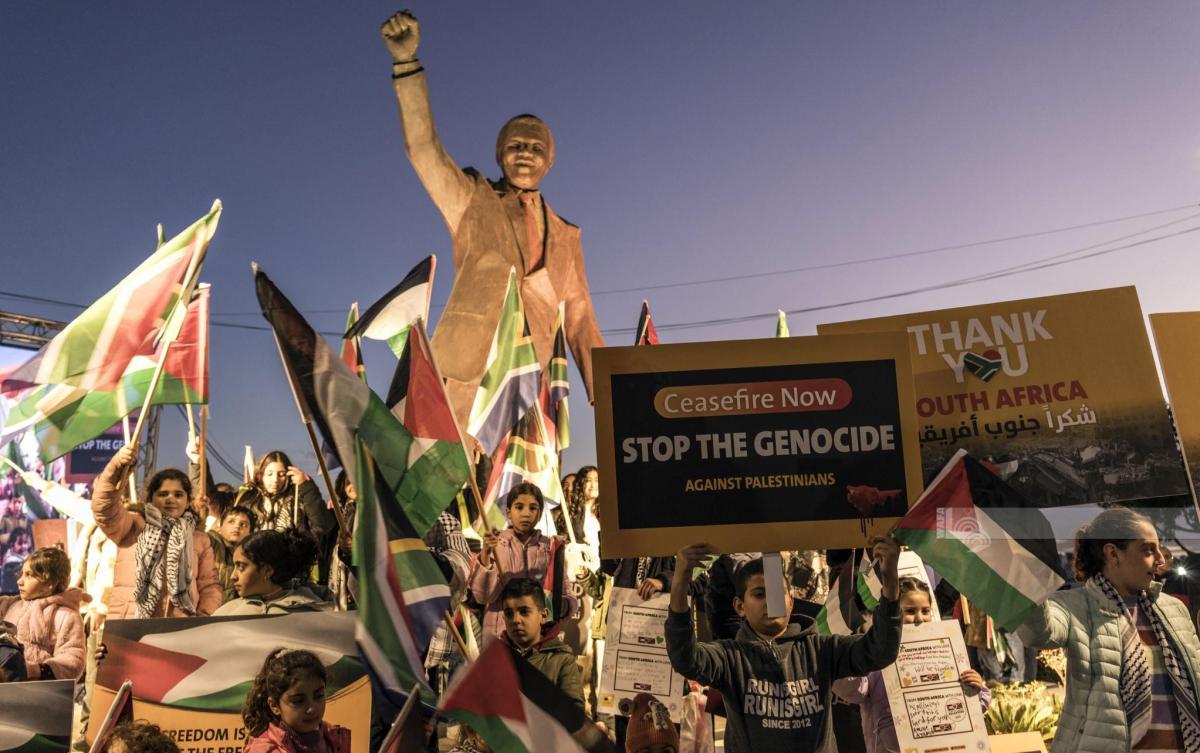
Palestinians
thank South Africa for taking their case to the International Court of
Justice, in Mandela Square, Ramallah, January 10, 2024.
Worldwide, more than 1,000 organizations have come out in support of South Africa's case before the International Court of Justice (ICJ), signing onto a letter issued by the Progressive International. Media reports say the list of organizations and political movements from Australia, Asia, Europe, Latin America and the Caribbean, the United States and Canada is growing by the hour.
Activists in Europe converged at the Peace Palace in The Hague, Netherlands, to rally in support of South Africa during the ICJ hearings on January 11 and 12. They were joined virtually by those taking up the call for a Global Cyber Intifada, to get the hashtag #EndIsraeliGenocide trending across all social media platforms.
In Canada, activists have been holding phone blitzes, calling the offices of Prime Minister Justin Trudeau, Deputy Prime Minister Chrystia Freeland, Foreign Minister Mélanie Joly, Ambassador to the UN Bob Rae and their local Members of Parliament, urging that Canada back South Africa's case at the ICJ.
Thirty Kuwaiti associations, leagues, unions and parties have come together to call on their government to back South Africa's case at the ICJ. Their statement issued on January 6 says war crimes, genocide and crimes against humanity as defined by international law and agreements are being committed in Gaza. It expresses shock and dismay "at Arab and Muslim countries' silence in the face of these atrocities, which in return is contributing to the blockade and hindering aid to the people of Gaza" and urges Kuwait to use its relationships and capabilities internationally to end the aggression and hold the occupation accountable, including by backing South Africa's case against Israel at the ICJ.
One campaign alone initiated in the UK in support of South Africa's genocide case against Israel has gathered more than 320,000 users worldwide,
Deputy Prime Minister of Belgium Petra De Sutter urged Belgium on January 8 to follow the lead of South Africa, stressing that Belgium should take action against Israel at the ICJ, as did former British Labour Party leader Jeremy Corbyn who called on the British government to do the same.
The Euro-Med Human Rights Monitor provided the South African legal team and the Office of the High Commissioner for Human Rights (OHCHR) with an initial memorandum detailing the most prominent mass graves that were established since Israel launched its current war on Gaza on October 8, 2023. Euro-Med also provided South Africa's legal team with other memoranda about mass killings, targeting of the health sector, and various outcomes of the genocidal war against Palestinians in the Gaza Strip. Additionally, Euro-Med further submitted a memorandum documenting the Israeli army's crimes during the period of December 29, 2023 when South Africa filed its claim with the ICJ to January 9. During that time the Israeli army killed 2,124 Palestinians and injured 3,463.
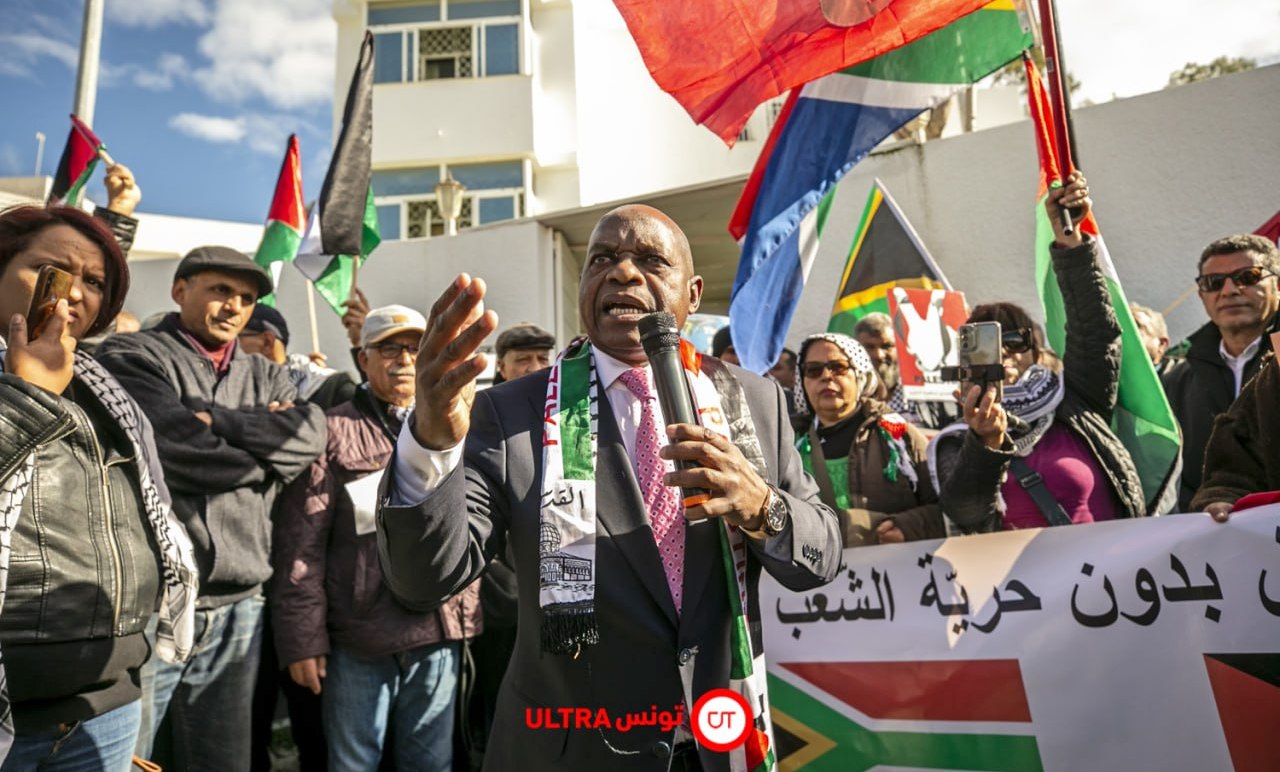
Demonstration outside
South African Embassy in Tunis, Tunisia, January 11, 2024, in support
of South Africa's case at the ICJ.
Israeli Pressure Campaign
to Derail Case
Accusing It of Genocide
Multiple sources have reported on a cable sent by the Israeli Foreign Ministry on January 4 directing Israeli diplomats to create international pressure on the International Court of Justice (ICJ) to not issue an injunction that orders Israel to suspend its military campaign in Gaza.
Fearing "significant potential implications that are not only in the legal world but have practical bilateral, multilateral, economic, security ramifications," the ministry instructed Israeli embassies to ask diplomats and politicians at the highest level "to publicly acknowledge that Israel is working together with international actors to increase the humanitarian aid to Gaza, as well as to minimize damage to civilians, while acting in self defence after the horrible October 7 attack by a genocidal terrorist organization."
Israeli ambassadors were also instructed to urgently work on obtaining such statements before the hearing. Israeli Prime Minister Benjamin Netanyahu likewise sent letters to dozens of world leaders along the same lines.
The U.S. was the first to comply. U.S. Secretary of State Antony Blinken personally issued a statement at a news conference in Tel Aviv. The South African submission to the ICJ, he said, "distracts the world from efforts for peace and security." Moreover, he deemed the charge of genocide "meritless."
Blinken, whose hands are dripping with Palestinian blood, said he found the charge of genocide against Israel "particularly galling" because, according to him, the real problem is Hamas, Hezbollah, the Houthis and Iran. He repeated the claim that Israel is doing its best to be careful in its campaign to wipe out Hamas.
His remarks on the eve of the public hearings on South Africa's case before the ICJ served to underscore U.S. isolation in its complicit role in the Israeli genocidal actions against the Palestinian people, especially in Gaza.
For Your Information
Activating the Convention on Genocide Against Israel and Complicit States
The Convention on the Prevention and Punishment of the Crime of Genocide was presented to the UN General Assembly (UNGA) in December 1948 and entered into force on January 12, 1951. Wikipedia reports that this followed the 1946 resolution of the UNGA that recognized genocide as an international crime and called for the creation of a binding treaty to prevent and punish its perpetration.
There are 152 state parties, states that have signed and ratified or acceded to the convention.
Craig Murray, former British Ambassador to Uzbekistan from August 2002 to October 2004, outlines in an article from November 13, 2023 what states parties can do under the convention, that each has the right to call out the genocide in progress in Gaza and report it to the United Nations. He says:
"In the event that another state party disputes the claim of genocide -- and Israel, the United States and the United Kingdom are all states party -- then the International Court of Justice is required to adjudicate on "the responsibility of a State for genocide."
"These are the relevant articles of the genocide convention:
Article VIII
Any Contracting Party may call upon the competent organs of the United Nations to take such action under the Charter of the United Nations as they consider appropriate for the prevention and suppression of acts of genocide or any of the other acts enumerated in article III.
Article IX
Disputes between the Contracting Parties relating to the interpretation, application or fulfilment of the present Convention, including those relating to the responsibility of a State for genocide or for any of the other acts enumerated in article III, shall be submitted to the International Court of Justice at the request of any of the parties to the dispute.
"Note that here 'parties to the dispute' means the states disputing the facts of genocide, not the parties to the genocide/conflict. Any single state party is able to invoke the convention.
"There is no doubt that Israel's actions amount to genocide. Numerous international law experts have said so and genocidal intent has been directly expressed by numerous Israeli ministers, generals and public officials.
"Definition of Genocide
"This is the definition of genocide in international law, from the Genocide Convention:
Article II
In the present Convention, genocide means any of the following acts committed with intent to destroy, in whole or in part, a national, ethnical, racial or religious group, as such:
(a) Killing members of the group;
(b) Causing serious bodily or mental harm to members of the group;
(c) Deliberately inflicting on the group conditions of life calculated to bring about its physical destruction in whole or in part;
(d) Imposing measures intended to prevent births within the group;
(e) Forcibly transferring children of the group to another group
"I can see no room to doubt whatsoever that Israel's current campaign of bombing of civilians and of the deprivation of food, water and other necessities of life to Palestinians amounts to genocide under articles II a), b) and c).
"It is also worth considering Articles III and IV:
Article III
The following acts shall be punishable:
(a) Genocide;
(b) Conspiracy to commit genocide;
(c) Direct and public incitement to commit genocide;
(d) Attempt to commit genocide;
(e) Complicity in genocide.
Article IV
Persons committing genocide or any of the other acts enumerated in article III shall be punished, whether they are constitutionally responsible rulers, public officials or private individuals.
"There is, at the very least, a strong prima facie case that the actions of the United States and United Kingdom and others, in openly providing direct military support to be used in genocide, are complicit in genocide.
"The point of Article IV is that individuals are responsible, not just states. So [Israel's Prime Minister Benjamin] Netanyahu, [U.S. President Joe] Biden and [UK Prime Minister Rishi] Sunak bear individual responsibility. So, indeed, do all those who have been calling for the destruction of the Palestinians.
"It is very definitely worth activating the Genocide Convention. A judgement of the International Court of Justice that Israel is guilty of genocide would have an extraordinary diplomatic effect and would cause domestic difficulties in the UK and even in the U.S. in continuing to subsidize and arm Israel."
The International Court of Justice is an organ of the United Nations. Murray says that "while the United States has repudiated its compulsory jurisdiction, the United Kingdom has not and the EU positively accepts it." He says:
"If the International Court of Justice makes a determination of genocide, then the International Criminal Court does not have to determine that genocide has happened.
"This is important because unlike the august and independent ICJ, the ICC is very much a western government puppet institution which will wiggle out of action if it can.
"But a determination of the ICJ of genocide and of complicity in genocide would reduce the ICC's task to determining which individuals bear the responsibility. That is a prospect which can indeed alter the calculations of politicians.
"It is also the fact that a reference for genocide would force the Western media to address the issue and use the term, rather than just pump out propaganda about Hamas [having] fighting bases in hospitals.
"Furthermore a judgement from the ICJ would automatically trigger a reference to the United Nations General Assembly -- crucially not to the Western-vetoed Security Council."
In a December 5, 2023 article for Pressenza, Sam Husseini argues for a combination of mass protest actions and diplomatic moves. He writes that the International Criminal Court has been asked by several countries, including South Africa, Bangladesh, Bolivia, Comoros, Djibouti, Colombia, Algeria and Türkiye to prosecute Israeli officials, but has not taken action. He says "The International Court of Justice, also called the World Court, in contrast has ruled against Israel. But so far these rulings have been advisory opinions. It ruled against Israel in a case regarding its wall in 2004. In another case before it, [it] is expected to rule against Israel's long-term policies."
"But what can be done now, Prof. Francis Boyle, who successfully represented the Bosnians before the World Court, argues is to use emergency processes to give more teeth to the World Court. This can be done by invoking the Genocide Convention. This is outlined by Boyle, noted by UN whistleblower Craig Mokhiber, backed by Nobel Peace Prize winner Mairead Maguire, and written about by myself. And most recently by Craig Murray, now a human rights activist who was the British Ambassador to Uzbekistan and Rector of the University of Dundee."
He ends his argument as follows:
"We need to keep pressing directly against the U.S. and Israeli governments, but their hearts are like stone. If we reach other states to invoke the Genocide Convention, it may be a key stop in curtailing the slaughter.
"Moreover, it could be a turning point in global relations. Should a positive emergency ruling by the International Court of Justice be forthcoming, it would dramatically isolate the U.S. and Israel at the UN. The U.S. would of course try to block anything at the UN Security Council. But with a World Court ruling, Boyle argues, the stage would be set for the General Assembly to assert itself using the Uniting for Peace procedure. Combined with sustained protests, like the WTO and other critical confrontations, the costs of continuing the slaughter could become unsustainable. Moreover, a World Court ruling could facilitate other legal efforts, like universal jurisdiction.
"For all that to happen, a country needs to step forward and invoke the Genocide Convention.
"Make no mistake; any nation that does this may well be targeted in insidious ways by the U.S. and by Israel. Any such nation should be afforded every bit of support people of goodwill can muster."
Other Developments
Growing Demands for Ceasefire
In the U.S., the group Rabbis for Ceasefire protested inside the UN Security Council chamber on January 9 and demanded an immediate ceasefire in Gaza. "We are here at the UN in prayer and determination to support the UN to ask for immediate, permanent ceasefire in Gaza and to the man [President Joe Biden] that the U.S. gets out of the way of the UN taking urgent action to save lives," a member of Rabbis for Ceasefire explained. Carrying banners that read "Biden: The world says ceasefire now" and "Biden: Stop vetoing ceasefire," demonstrators sang inside the chamber before being escorted out by security officers.
Meanwhile, the pro-Israel organization Americans for Peace Now joined the call for a ceasefire. According to The Times of Israel, up to this point the only U.S. Jewish groups to call for a ceasefire have been anti-Zionist or non-Zionist organizations. Americans for Peace Now is a member of the Conference of Presidents of Major American Jewish Organizations, the consensus-driven foreign policy coalition of U.S. Jewish organizations that has one overriding mission: backing Israel. Other members of the Conference of Presidents of Major American Jewish Organizations, such as J Street and the American Israel Public Affairs Committee, the largest pro-Israel lobby, have cancelled their annual conferences to avoid public condemnation from within their ranks of Israel's genocidal aggression in Gaza.
A group of former White House interns (2022 and 2023) have written a petition accusing U.S. President Joe Biden of "betraying" his vow to achieve equality and justice by backing Israel's war on Gaza. The letter reads that Biden calls on the youth to "lead through the world's most pressing challenges" but details how "our voices are ignored as our generation speaks in solidarity with the majority of Americans and the world, underscoring the contrast between the values we embraced together and the actions we now witness." The letter urges the administration to take "concrete steps" to end the apartheid in Palestine and the ethnic cleansing ongoing in Gaza by calling for a ceasefire, ending unconditional aid to the occupation, releasing captives and Palestinian prisoners, and, most importantly, labelling Israel's actions as war crimes. "Anything less than these measures undermines the justice we collectively aspired to achieve."
In Chile some 100 lawyers filed a complaint before the International Criminal Court (ICC) against Israeli Prime Minister Benjamin Netanyahu accusing him of committing crimes against humanity, genocide and war crimes in Gaza. The complaint, presented on December 22, 2023 in The Hague, was led by former Ambassador Nelson Hadad, Quds Press reported. The complainants, most of Palestinian descent, are calling for an arrest warrant to be issued for Netanyahu and other individuals responsible for these alleged crimes. The objective of the submission is to prove that genocide, forced displacement, war crimes and violations of international humanitarian law are taking place in Gaza.
Canadian Support for Israeli Genocide Brought to International Criminal Court
A trip made by five Canadian parliamentarians to Israel in support of the Zionists' atrocities in Gaza, has led to the International Criminal Court (ICC) being notified that these Members of Parliament may be guilty of aiding and abetting Israel's crimes.
The five MPs -- two Liberals and three Conservatives -- participated in a trip of some 60 people, organized by a number of Canadian Jewish federations in November 2023. The MPs were Anthony Housefather, Marco Mendocino, Melissa Lantsman, Michelle Rempel-Garner and Marty Morantz.
In a public statement, also sent to the ICC in The Hague, Montreal organization Palestinian and Jewish Unity (PAJU) stated that by traveling to Israel to lend their moral support to Israel's actions in Gaza, the five MPs "may be guilty of aiding and abetting what is being referred to by legal experts as a possible genocide in Gaza."
PAJU explains that the Rome Statute that established the ICC in 2002, "provides clear criteria in Articles 6, 7 and 8 as to the definition of genocide, war crimes and crimes against humanity respectively. It is clear that Israel has transgressed all three and will continue to do so as long as those public officials and institutions continue to support Israel's impunity. This is exactly what the five above-mentioned Canadian MPs will have done by travelling to Israel to publicly support its brutal and inhuman campaign. Hence, the five MPs must be investigated by the Prosecutor of the International Criminal Court.
"It will be up to the ICC to determine if the five aforementioned MPs -- having publicly stated their support for Israel despite the evident war crimes of which it is guilty -- are themselves guilty of aiding and abetting those war crimes. As Canada is a signatory to the Rome Statute and is therefore bound by all of its articles, if found guilty of aiding and abetting Israel's war crimes, an arrest warrant must subsequently be issued by the ICC for the five Canadian MPs and a demand for their extradition to the ICC at The Hague, Netherlands be issued to the Minister of Justice of Canada.
 "Be it noted that
there is no statute of limitations on acts
of
genocide, war crimes or crimes against humanity. PAJU will continue to
scrutinize all statements made by elected officials concerning the
carnage in Gaza and will take the appropriate legal steps to see to it
that the rule-of-law is
stringently respected. It should be noted that, in Canada, a consortium
of lawyers have announced their intention to prosecute legal claims
against Canadian government officials complicit with Israeli war crimes
and have served four Canadian government ministers with legal papers,
including Prime
Minister Justin Trudeau. Let all elected officials who represent the
federal, provincial and municipal governments and their adjoining
institutions govern themselves accordingly.
"Be it noted that
there is no statute of limitations on acts
of
genocide, war crimes or crimes against humanity. PAJU will continue to
scrutinize all statements made by elected officials concerning the
carnage in Gaza and will take the appropriate legal steps to see to it
that the rule-of-law is
stringently respected. It should be noted that, in Canada, a consortium
of lawyers have announced their intention to prosecute legal claims
against Canadian government officials complicit with Israeli war crimes
and have served four Canadian government ministers with legal papers,
including Prime
Minister Justin Trudeau. Let all elected officials who represent the
federal, provincial and municipal governments and their adjoining
institutions govern themselves accordingly.
"PAJU considers that, given the severity of the possible charges which may be levied against the five aforementioned Members of Parliament and others who may have contravened international law regarding the question of support for the Israeli attacks on Gazan civilians and infrastructure, we advise the leaders of the political parties sitting in Canada's House of Commons -- copied on this letter of intent -- to share this press release with all Members of Canada's Parliament. We shall consider it their responsibility to do so."
Unlike the International Court of Justice, which operates only at the level of Member States of the UN and is part of the UN system, the ICC is not part of the UN system and can prosecute individuals.
Israel is not a signatory of the Rome Statute and thus is not bound by ICC rulings. Furthermore, the cases taken up and rulings issued by the ICC reflect the double standards of the imperialists as concerns matters of international relations, having never brought prosecution for war crimes against the U.S. or NATO countries, despite their war crimes being well documented.
Ultimately, holding the U.S. imperialists, NATO and those they support -- like Israel -- to account for war crimes is a matter that lies in the hands of the people and their actions to renew political arrangements and international relations.
Desperate U.S./UK Attack on Yemen
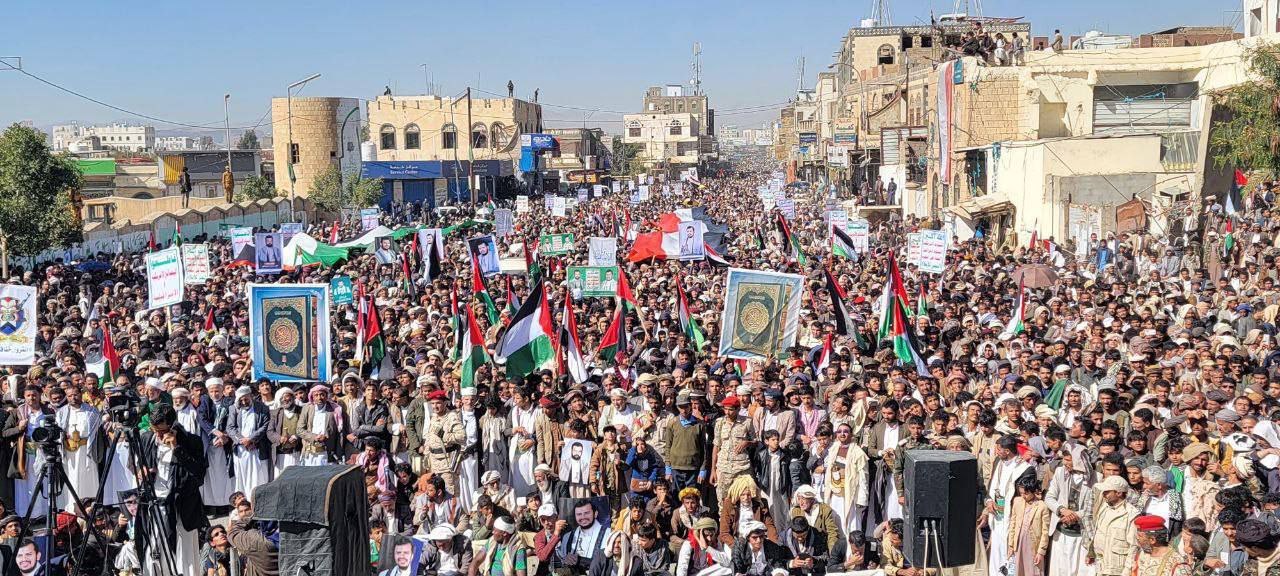
Demonstration in Yemen,
January 12, 2024 denounces U.S./UK attack, stands with Palestinian
people.
During the night of January 12, the United States and Britain engaged in an irresponsible use of force by launching military strikes in Yemen. They claim their aim is to stop the Yemeni resistance actions undertaken to impede shipping to Israel in the Red Sea so long as Israel's attacks on Gaza continue. A White House statement said Canada, the Netherlands, Bahrain, and Australia played a supporting role. According to news reports, members of the Canadian Armed Forces deployed with U.S. Central Command helped plan the attacks. The military strikes not only killed five people in Yemen but pose the grave danger of broadening the war in the Middle East.
The irresponsible attacks are no doubt also intended to threaten the people of Yemen to desist in providing material support for the Palestinian resistance. This will not happen. Hours after the attacks, in a statement on Friday, the Houthis Supreme Political Council stated that "all American-British interests have become legitimate targets for the Yemeni armed forces in response to their direct and declared aggression against the Republic of Yemen."
"The joy of the aggressors will not be long, and our hand will be the upper hand, God willing," the statement added.
Calling the strikes on Yemen "barbaric," the Houthis added that they will also continue targeting ships heading towards Israel for as long as its war on Gaza continues, and also threatened retaliation.
"The American and British enemy bears full responsibility for its criminal aggression against our Yemeni people, and it will not go unanswered and unpunished," Yahya Saree, the Houthis military spokesperson warned.
Yemen's government, put in place by Saudi Arabia in its U.S.-backed war against that country, blamed the Houthis themselves for the UK and U.S. strikes on the country, saying the rebels bore responsibility for dragging Yemen into an arena of military confrontation with its attacks in the Red Sea.
Earlier, U.S. President Joe Biden, who claims the actions of its navy in the Red sea and military attacks are to defend freedom of navigation, warned that he would "not hesitate" to take further action if necessary, Al Jazeera reported.
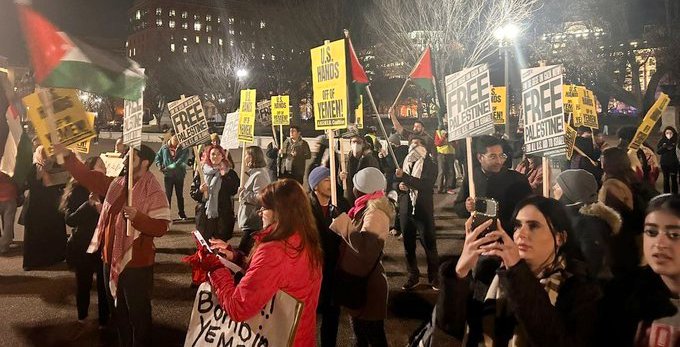
Demonstration outside the
White House in Washington, DC, January 12, 2024, denounces U.S. for
attack on Yemen.
"These targeted strikes are a clear message that the United States and our partners will not tolerate attacks on our personnel or allow hostile actors to imperil freedom of navigation," Biden said of the attacks by air and sea.
Pentagon spokesperson Pat Ryder told Al Jazeera that the U.S. military is closely monitoring the situation and hasn't seen any retaliatory attacks from the Houthis so far.
"Our goal here is to ensure this vital waterway [the Red Sea] is safe and secure for international shipping and mariners," he said.
If the U.S. and its NATO partners including Canada want peace, they should refrain from the use of force and threatening the use of force and provide serious problems and conflicts with peaceful solutions. The refusal to find alternatives to the use of force shows their arguments do not merit consideration because they are self-serving, illogical and irrational. The peoples must set their own course based on their own interests and line of march to achieve them.
(To access articles individually click on the black headline.)
Website: www.cpcml.ca Email: editor@cpcml.ca

